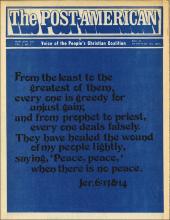Twenty-eight years ago this year (April 9, 1945) Dietrich Bonhoeffer was hung to death at the youthful age of 39. An eye-witness account by the camp doctor in the Flossenburg concentration camp in
For 12 years, the years of the great holocaust’s dark night, Bonhoeffer had been a marked man.
He was cut off the air in
He was a catalyst in the organizing of the Pastors’ Emergency League.
He was a leader in the
He served as the director of an illegal seminary.
His seminary was dissolved by the Gestapo.
He was forbidden to speak or preach by the Gestapo.
He was forbidden to publish.
He carried on an assignment as an intelligence agent in Hitler’s own military counterespionage operation.
He was engaged by night in political resistance activity.
He was a go-between on behalf of the resistance movement and contacts outside
Read the Full Article

